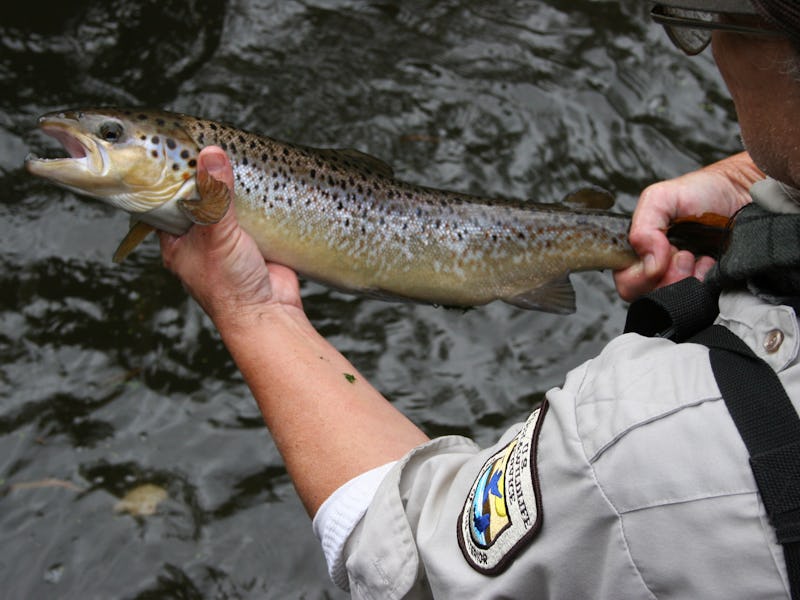Salmon Farm Blames 'Eclipse Tides' for Damage, But It's a Fishy Story
Thousands of potentially destructive fish are on the loose.

A tidal expert is questioning claims made by a fish farm near Seattle that the impending solar eclipse destroyed its floating pen full of Atlantic Salmon.
The floating pen contained 305,000 salmon weighing 3 million pounds and imploded at a Cooke Aquaculture fish farm off Cypress Island in Washington’s Puget Sound on Saturday around 4 p.m. Pacific. The corporation estimates that several thousand fish escaped, but says that it will not know precise numbers until it conducts an inventory after harvesting.
Because ocean tides are caused by gravitational pull from the sun and the moon, an eclipse often creates especially large tides: The sun and moon line up and pull in nearly the exact same direction, which strengthens the net gravitational force.
In a statement released Tuesday, Allen Cooke, who runs the fish farm, blamed “exceptionally high tides and currents coinciding with this week’s solar eclipse” that led to a “structural failure” of the net.
But expert Jonathan White, author of Tides: The Science and Spirit of the Ocean, doesn’t buy the story. “They can’t blame this on the tide,” he tells Inverse.
White looked at the tide levels in Seattle, which is 70 miles away from Cypress Island, because the tide levels don’t change much between the two locations. At the eclipse’s peak on Monday, Seattle’s high tide reached a level of 11.7. White says that 2017 will contain 160 tides that are as high as that or higher, meaning that this tide height was at the 45th percentile for the year.
“In other words, if they weren’t prepared for this tide, they’ve got a whole lot more coming,” White says.
The implosion occurred 46 hours before the solar eclipse reached its maximum in the area. Saturday’s tide reached a level of 11.2 at 5 p.m. Pacific, so White estimates that it was about 11 at 4 p.m., the approximate time of the implosion. He says that the impending eclipse probably did magnify that tide to a higher level than it would have otherwise reached.
A Cooke Aquaculture net pen.
“The eclipse does have an effect, but in this case, the effect was not so large that it created an extraordinary large tide,” White says.
That’s not true of the entire country. The eclipse did bring some of the highest tides of the year in parts of the northeast, says White.
Locals were skeptical of Cooke Aquaculture’s explanation. The Seattle Times reported that the corporation’s story was “met with widespread disbelief.” Chris Wilke, executive director of the environmental nonprofit Puget Soundkeeper, told the paper that it “is B.S.”
Our Sound, Our Salmon, an activist organization attempting to stop the expansion of net pens in Puget Sound, released a statement on Wednesday blaming Cooke, not the eclipse: “After a review of the data, it is clear that the claim of an abnormal tidal event associated with the solar eclipse is a myth. We hold Cooke Aquaculture responsible for this disaster, and would support an independent investigation into the matter.”
The fish farm is standing firm in its claims, however: “We are aware of the tide tables,” Vice President of Communications Nell Halse tells Inverse. “We also have farm staff who have years of experience of working on the water. They experienced currents of 3.5 knots during repeated strong tides that led to the equipment failure. They were there on the site for long hours for several days trying to work around the tides.”
“This farm has operated successfully for 30 years in this location,” she says. “I think the photos of the damaged farm tell the story.”
This is not the first time that fish have escaped a Cooke Aquaculture net. A February storm pushed over a mooring in a pen at Canada’s Shelburne Harbour, causing a breach in the net that allowed possibly hundreds of salmon to swim away.
A photo of the floating salmon pen that broke, obtained by the Wild Fish Conservancy in Northwest Washington state.
Floating Pens are Controversial
Although the farm assures the public that the event will have no negative environmental impact, activists and local fishermen are not so sure. They fear that these non-native, previously cooped-up Atlantic salmon will spread disease or parasites, compete with local fish and orcas for resources, or eat local salmon.
“It’s a devastation,” fisherwoman Ellie Kinley told The Seattle Times. “We don’t want those fish preying on our baby salmon. And we don’t want them getting up in the rivers.”
The Washington Department of Fish and Wildlife agreed that these fish could cause damage. It is encouraging locals with fishing licenses to catch as many of the escaped salmon as possible.
Our Sound, Our Salmon writes the following about why net pens are dangerous:
“These net pens have a poor environmental safety record that includes thousands of escaped Atlantic salmon, a major viral outbreak, and decades of pollution. This history of environmental harm is consistent with the environmental record of the Atlantic salmon net pen industry, which has an extensive history of negatively impacting local ecosystems and harming wild fish populations everywhere they operate.”
The organization is protesting Cooke Aquaculture’s plans to build a pen in the nearby Strait of Juan de Fuca that would be larger and farther from shore than any of the eight existing pens in Washington.
Every state on the West Coast except Washington bans Atlantic salmon net pens.
“It’s really a shame that this has happened,” White tells Inverse. “It underscores the risk and the dangers of farm fishing.”